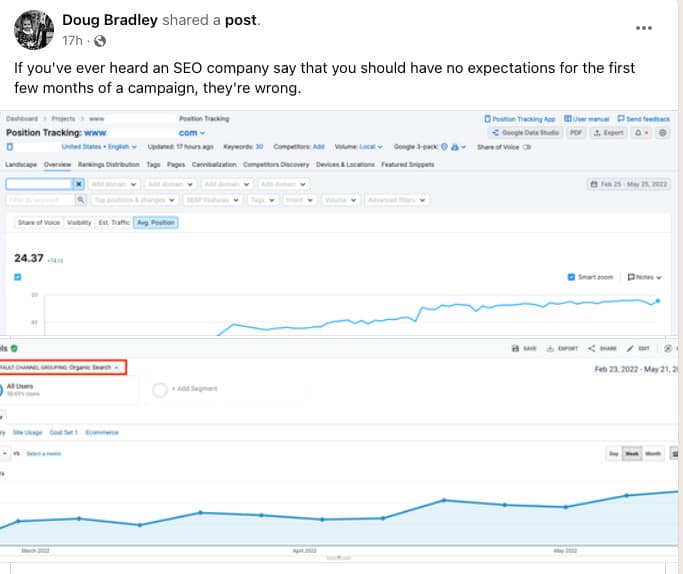
How long does SEO take? When can I expect to see results? What results should I expect to see?
These are all reasonable questions that we field from lawyers every day.
And, like many legal answers, the answer is: It depends.
Yes, I know that's not the answer you wanted. But it's the most honest answer.
Recently, Doug Bradley at Everest Legal Marketing posted a case study to the Let's Talk Legal Marketing Facebook group, which I'll post here:

"If you've ever heard an SEO company say that you should have no expectations for the first few months of a campaign, they're wrong.
SEO does take time, but a lot can be done in the first 90 days of a campaign. For 30 competitive search phrases, this client had an average position of 98.5 (Page 10) 90 days ago. Today it's 24. That may not sound impressive, but 10 of those phrases are on page 1 of Google, 9 are on page 2, and the remainder are on pages 3 - 6. In this same time frame, Organic Traffic has quintupled."
To which I commented:
"The key here is expectations.
No expectations? ![]()
Fraudulent expectations? ![]()
Meaningless expectations? ![]() "
"
I agree with Doug that SEO companies should set expectations.
The issue is what expectations can be reasonably set?
Let's take Doug's example: Position 90 to position 24 in 90 days for 30 competitive search phrases. Organic traffic has quintupled.
First, was that the expectation that was set at outset of the campaign (I'll let Doug chime in the comments)? Was quintupling of traffic in 90 days the expectation that was set?
Second, is the traffic qualified? Did it turn into open cases? Was that even tracked (it was indicated in the thread that the client was not doing call tracking)?
After all, you can't pay your expenses with traffic.
Third, is the implication that traffic quintupled from organic clicks from pages 2, 3, and 6? If so, that's an outlier. I'd be really interested to see these SERPs.
Fourth, was it profitable? In other words, how much did the firm have to pay to get these results and how much money did the firm make from these results?
Giving Doug the benefit of the doubt, let's say he did set those expectations at the start and he did quintuple relevant organic traffic and that relevant organic traffic turned into an incremental increase in new fees for the firm from non-brand queries.
Then the question is how did Doug know he could deliver on that expectation?
This is where "it depends" comes in.
Here's the most obvious example: The client had a major technical issue that Doug knew he could fix quickly and would have a massive impact on rankings.
My point is that expectation setting and forecasting in SEO is tricky. Let's face it, we're talking about predicting the future. Even the most sophisticated models require a lot of data and assumptions to have any degree of reliability.
Most lawyers should know this. Do you guarantee results to your clients? I sure hope not. Do you try to set reasonable expectations about possible outcomes based on your experience and the specific facts and circumstances surrounding each case? Of course, you do.
The same is true for SEO and marketing more generally.
No one can guarantee rankings.
Anyone telling you anything else is at best inexperienced and at worst unscrupulous.

Over the years, law firm prospects have sent us reports from just about all of our competitors. Unfortunately, even today, some law firm marketing agencies still mislead their clients via "reporting." One particularly egregious example comes in the form of ranking reports. Which prompted this LinkedIn post. To my surprise, I received a lot of […]
John Wanamaker supposedly said "Half the money I spend on advertising is wasted; the trouble is I don't know which half." In an an effort to figure out "what half is working," attribution was born. Coupled with a transition from traditional, offline ads to digital media, attribution became the holy grail for analyzing advertising spends. But […]
I recently asked ChatGPT, "What are some of the top personal injury law firms in Chicago?? Actually, first I ask "who are some of the top personal injury lawyers in Chicago?" ChatGPT couldn't handle that one, so I modified the prompt. ChatGPT listed five very well-known firms downtown. Can you guess the other four? That's […]
If you're like me, you have some degree of AI, ChatGBT, Bard, exhaustion. Now don't get me wrong, this is stuff is remarkable and is changing, well, a lot. But before you hook up the ChatGPT API to your WordPress API and crank out 10,000 pages, here are a few things to think about. Let's […]
If you know me, you know my opinions about links and SEO advice from Google. If you don't, here's the TL;DR: Meh, links! Meaning, all things being equal, links still remain a competitive difference maker for ranking. Take Google's SEO advice with several grains of salt. Google has no economic incentive to help your site […]
The best marketing advice I can give you is to be authentic. Of course, you don't find that very helpful in terms of meeting your growth goals. So, you might decide to game the system. As I'm writing this, one of the more popular ways to gain the system is to pay for engagement. This […]
The following post was written by ChatGPT. ChatGPT, developed by OpenAI, is a state-of-the-art language model that can generate human-like text based on a given prompt or context. This technology has the potential to revolutionize the way that businesses, including law firms, market themselves to potential clients. One way that a law firm could use […]
How long does SEO take? When can I expect to see results? What results should I expect to see? These are all reasonable questions that we field from lawyers every day. And, like many legal answers, the answer is: It depends. Yes, I know that's not the answer you wanted. But it's the most honest […]
And how much time should they spend doing it? I recently had the privilege of chatting with Tyson, Jim, and Conrad for an upcoming episode of The Maximum Lawyer Podcast. If you're not familiar with The Maximum Lawyer community, you should definitely check it out. Jim asked a really great question about who should do […]